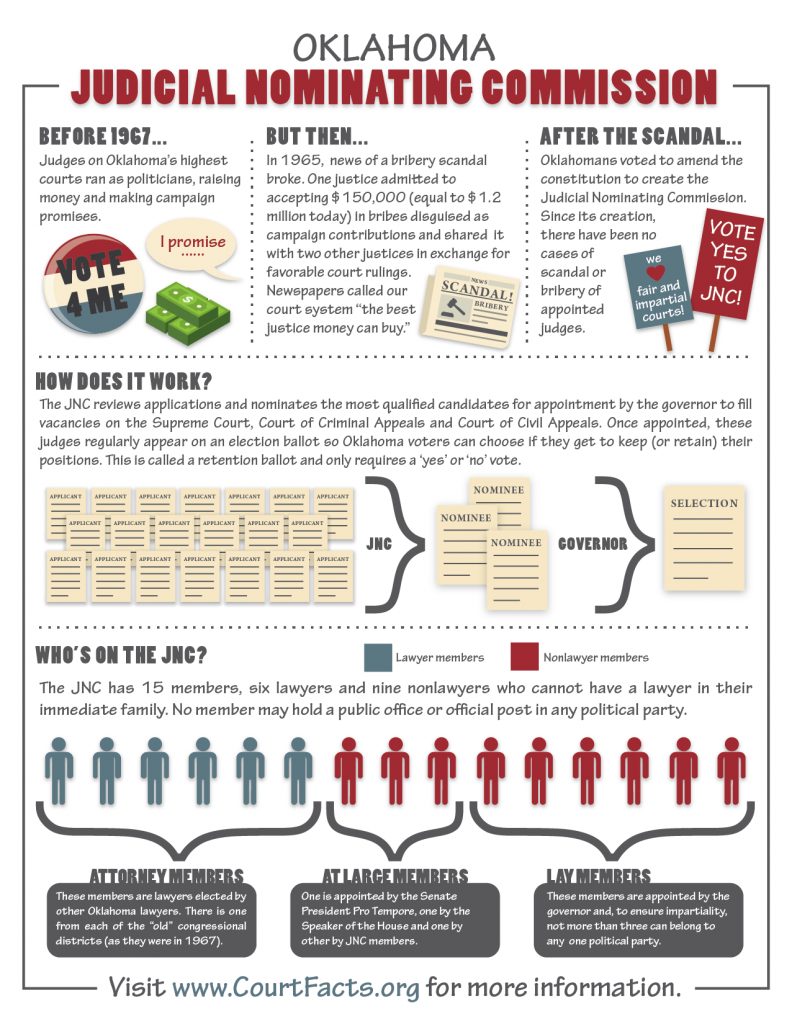Judicial Nominating Commission
How the Judicial Nominating Commission works
The Judicial Nominating Commission consists of 15 unpaid volunteer members. Six members are lawyers elected by their fellow Oklahoma Bar Association members, each representing one of six congressional districts across the state, as they were in 1967 when the commission was established. They each serve a 6-year term.
Six members are appointed by the governor, and they, too, serve 6-year terms. To ensure lawyers cannot outweigh nonlawyers on the commission, none of the governor’s picks can be a lawyer or have a lawyer in their immediate family (even in another state). To ensure bipartisan balance, no more than three of the governor’s picks can be from one political party.
The three remaining members are called “at-large members.” One is appointed by the speaker of the House, one by the president pro tempore (the leader of the Senate) and one is selected by the other 14 members of the commission. Each of these three members serves a 2-year term and, again to ensure bipartisan balance, not more than two can be from the same political party.
Though most lower court judges are still elected, judges and justices on the highest courts in Oklahoma – the Supreme Court, Court of Criminal Appeals, Court of Civil Appeals and the Workers’ Compensation Court – are appointed by the governor. When a judge or justice on these courts retires or their term expires, the commission carefully considers all applicants for a new justice or judge. Together as a commission, they select the three most-qualified candidates and send the applications to the governor for consideration. Of these three, the governor selects one to fill the judicial vacancy.
View more about the Judicial Nominating Commission, including member biographies and vacancies, on the Oklahoma Supreme Court Network JNC website.
How the Judicial Nominating Commission was formed
Prior to 1967, judges on Oklahoma’s highest courts were elected. They ran campaigns as politicians, raising money and making campaign promises. In 1967, in the wake of a massive scandal, voters chose to amend the Oklahoma Constitution to establish governor-appointed judges and create the Judicial Nominating Commission.
In 1965, in a speech on the floor of the Oklahoma House of Representatives, it was revealed that a former Supreme Court justice had made a sworn statement admitting that he and two sitting justices had taken bribes. In that statement, he revealed the justices were being influenced to make certain rulings by political pressure and bribes disguised as campaign contributions.
Justice N.S. Corn testified that he took a bribe of $150,000 (equaling nearly $1.4 million today) to rule in favor of an Oklahoma business. Of the $150,000, he claimed to have paid $7,500 (or nearly $70,000 today) to two other justices to secure their votes too.
One justice was jailed, one was impeached and removed from office and one resigned. The scandal gained national attention, and Oklahoma’s court system was called “the best justice money can buy.” But the scandal also brought about a positive change in how Oklahoma’s highest court judges are chosen.
Now, the Judicial Nominating Commission helps ensure impartial judges by eliminating the influence of political pressure and campaign promises by presenting only the most qualified applicants to the governor for appointment. Since the new system was enacted, there have been no instances of bribery or scandal involving appointed judges.

This website has been created by the Oklahoma Bar Association to provide facts about the third branch of government and accurate non-partisan information to Oklahoma voters.
Our goal is to ensure that every Oklahoman has access to a fair and impartial court system, where there is no bias, prejudice or political influence.
This website has been created by the Oklahoma Bar Association to provide facts about the third branch of government and accurate non-partisan information to Oklahoma voters.
Our goal is to ensure that every Oklahoman has access to a fair and impartial court system, where there is no bias, prejudice or political influence.
